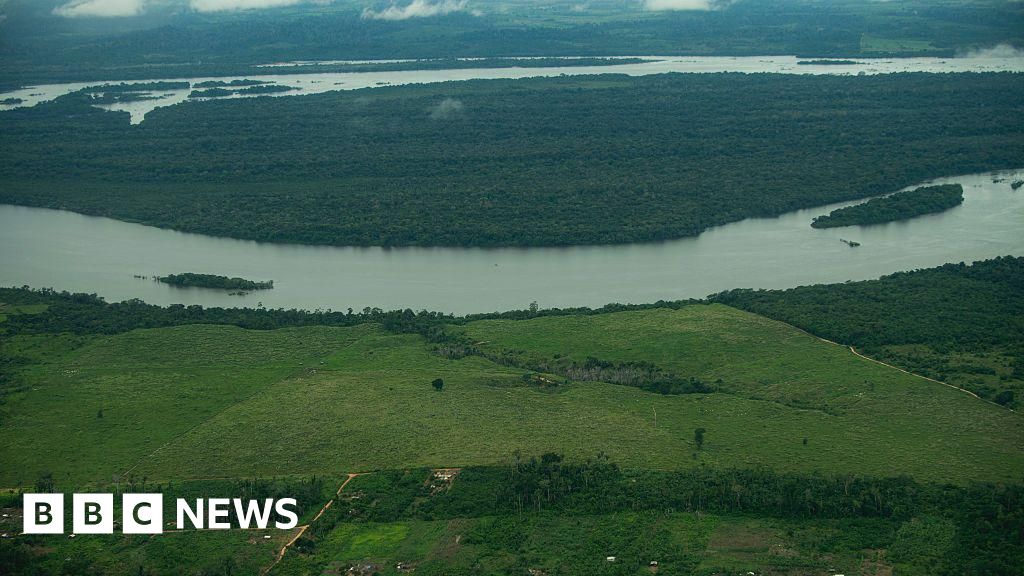Science
Brazil’s New Development Law Sparks Fears of Amazon Deforestation

A new development law in Brazil, aimed at expediting approvals for various infrastructure projects, has raised significant concerns about its potential impact on the environment and human rights. According to Astrid Puentes Riaño, a UN Special Rapporteur, the legislation could lead to “significant environmental harm and human rights violations,” marking a severe rollback of protections that have been in place for decades, especially concerning the Amazon region.
As Brazil prepares to host the COP30 climate summit later this year, lawmakers recently approved measures to simplify the environmental licensing process for projects such as roads, dams, and mining operations. While the bill has yet to receive formal approval from President Lula da Silva, critics have already dubbed it the “devastation bill,” warning that it could facilitate environmental abuses and further deforestation in the Amazon.
Proponents of the bill argue that the new nationwide licensing regime is necessary to streamline the lengthy and complicated approval process faced by companies. Under the proposed changes, developers of smaller projects would be allowed to self-declare their environmental impact through an online form. Supporters claim this would reduce bureaucratic delays, giving businesses greater certainty regarding their operations.
However, Ms. Riaño expressed grave concerns that the relaxed regulations might apply to certain mining projects, potentially leading to increased deforestation in the Amazon. She warned that the automatic renewal of project licenses—without comprehensive environmental impact assessments—could enable developments that harm the environment. According to her, “This will prevent environmental impact assessments from being done on these projects. Some of the projects will include mining projects or infrastructure projects where a full assessment is needed.”
Much of the deforestation and land clearing in the Amazon has historically been driven by agriculture and mining, often illegal. Ms. Riaño highlighted that the new law represents a backward step in efforts to mitigate those pressures. Her comments follow a troubling analysis published two months ago, indicating that vast areas of the Amazon were destroyed in 2024, exacerbated by forest fires fueled by drought.
Concerns Over Fast-Tracking and Indigenous Rights
The new law stipulates that environmental agencies would have a maximum of 12 months, extendable to 24, to decide on licenses for strategic projects. If they fail to meet this deadline, a license could be granted automatically. Proponents argue that this approach will prevent delays that have hindered vital projects, including hydroelectric dams and rail lines for grain transport.
Yet, Ms. Riaño emphasized that while efficiency is essential, environmental assessments must remain “comprehensive” and “based on the science.” The law also aims to reduce the requirement for consultation with indigenous communities and traditional quilombola populations unless they are directly impacted by projects. This has raised alarms among UN experts, who warn that fast-tracking assessments could undermine participation and violate human rights.
While supporters assert that the law will bolster economic development, especially in renewable energy sectors, critics fear that weakening environmental protections may elevate the risk of disasters and violate indigenous rights. UN experts contend that the legislation could contradict constitutional rights that guarantee the right to an ecologically balanced environment, suggesting that legal challenges may arise as a result.
The legislation has passed both the Senate and the Chamber of Deputies and is now awaiting the decision of President Lula da Silva, who has until August 8, 2024, to either approve or veto the law. Marina Silva, Brazil’s Minister of Environment and Climate Change, has vocally opposed the bill, calling it a “death blow” to environmental protections. Despite this, she has previously faced disagreements with the president on various issues, including proposals for oil drilling in the Amazon basin.
Even if the president decides to veto the bill, there is a possibility that the conservative-leaning Congress may attempt to overturn that decision. The Brazilian Climate Observatory has labeled the bill the “biggest environmental setback” since the military dictatorship in Brazil, which saw significant deforestation and the displacement of many indigenous communities.
According to Ms. Riaño, scientists estimate that the bill could remove protections from over 18 million hectares of land—an area roughly the size of Uruguay—presenting a dire threat to the Amazon and its ecosystems. She stressed that the consequences of this legislation could be profound and lasting.
-

 Entertainment2 months ago
Entertainment2 months agoIconic 90s TV Show House Hits Market for £1.1 Million
-

 Lifestyle4 months ago
Lifestyle4 months agoMilk Bank Urges Mothers to Donate for Premature Babies’ Health
-

 Sports3 months ago
Sports3 months agoAlessia Russo Signs Long-Term Deal with Arsenal Ahead of WSL Season
-

 Lifestyle4 months ago
Lifestyle4 months agoShoppers Flock to Discounted Neck Pillow on Amazon for Travel Comfort
-

 Politics4 months ago
Politics4 months agoMuseums Body Critiques EHRC Proposals on Gender Facilities
-

 Business4 months ago
Business4 months agoTrump Visits Europe: Business, Politics, or Leisure?
-

 Lifestyle4 months ago
Lifestyle4 months agoJapanese Teen Sorato Shimizu Breaks U18 100m Record in 10 Seconds
-

 Politics4 months ago
Politics4 months agoCouple Shares Inspiring Love Story Defying Height Stereotypes
-

 World4 months ago
World4 months agoAnglian Water Raises Concerns Over Proposed AI Data Centre
-

 Sports4 months ago
Sports4 months agoBournemouth Dominates Everton with 3-0 Victory in Premier League Summer Series
-

 World4 months ago
World4 months agoWreckage of Missing Russian Passenger Plane Discovered in Flames
-

 Lifestyle4 months ago
Lifestyle4 months agoShoppers Rave About Roman’s £42 Midi Dress, Calling It ‘Elegant’









